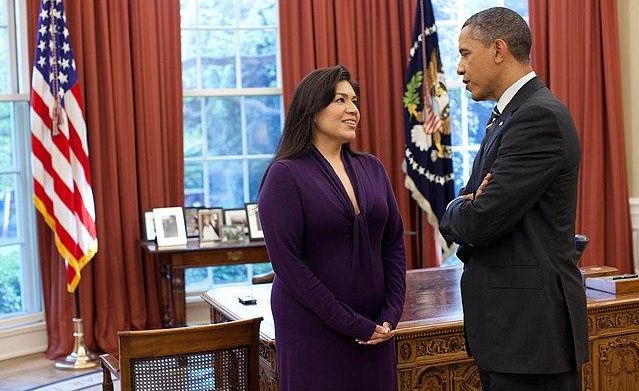187 years after the House said it'd seat a member of the Cherokee Nation, it may finally happen
We can't break another promise.
Cherokee Nation Vice President of Government Relations Kimberly Teehee in 2019.
One hundred and eighty-seven years ago, the United States government promised the Cherokee Nation a seat in the House of Representatives as part of the 1835 Treaty of New Echota. A minority group of Cherokee leaders signed the treaty, forcing the tribe to give up its ancestral land and relocate west of the Mississippi River.
The treaty was unpopular with a majority of tribe members and when they were slow to move, they were forced out of their homeland. This resulted in more than 4,000 Cherokee people dying during the forced relocation that became known as the “Trail of Tears.”
Article 7 of the Treaty of New Echota says that the Cherokee Nation “shall be entitled to a delegate in the House of Representatives of the United States whenever Congress shall make provision for the same.”
On Wednesday, the United States came closer to making good on the promise. The House Rules Committee held a historic hearing where representatives from the Cherokee Nation spoke in favor of seating a delegate from the tribe as promised nearly two centuries ago.
“It’s time for this body to honor this promise and seat our delegate in the House of Representatives,” Cherokee Nation Principal Chief Chuck Hoskin Jr. said in his testimony. “No barrier, constitutional or otherwise, prevents this.”
The Cherokee Nation has named former Obama White House advisor Kim Teehee to be the delegate.

Kim Teehee and President Obama in the White House.
“Mr. Chairman, I am a proud American, and I am a proud citizen of the Cherokee Nation. I have great respect for the United States House of Representatives. Because of all of this, it is my firm belief and expectation that the House of Representatives will take swift action to seat our delegate to Congress, honor our treaty rights, and therefore make the United States good on its promise to our Cherokee ancestors,” Hoskin added.
The Cherokee Nation hopes to seat a nonvoting delegate similar to the District of Columbia, the Virgin Islands, Guam, American Samoa and the Commonwealth of the Northern Mariana Islands.
Representative Jim McGovern, a Massachusetts Democrat, thinks it's important for the U.S. government to uphold its agreements with Indigenous tribes. “The history of this country is a history of broken promise after broken promise to Native American communities,” said McGovern. “This cannot be another broken promise.”
\u201c#CherokeeDelegate. We made history today, but we must keep advocating for America to keep its treaty promise to @CherokeeNation to a delegate to Congress. Today\u2019s hearing was powerful and a basis for real action.\u201d— Chief Chuck Hoskin, Jr. (@Chief Chuck Hoskin, Jr.) 1668630794
Before the House can act on the resolution it has to decide on the proper path to make it law and how the Nation should select its delegate. The House also wanted to know why it took so long for the Cherokee Nation to pursue its right to representation.
“We are now in a position where we can, as a practical matter, assert this right,” Hoskin said. “Whereas my predecessors in the two centuries before, frankly we were just trying to hang on to our way of life and rebuild.”
The United States has a long, terrible history of breaking promises it's made to Native people. Allowing the Cherokee Nation to have a delegate in the House would send a strong message that those days are over.
“For nearly two centuries, Congress has failed to honor this promise. Yet the obligation to seat a Cherokee Nation delegate remains as binding today as it was in 1835,” the Cherokee Nation said.
